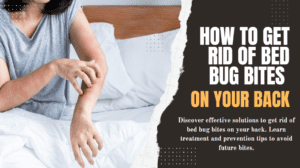Setting the Context
Welcome to another insightful post on Bed Bug Bite, your trusted source for all things related to bed bugs. With the summer season in full swing, many of you may be experiencing the notorious discomfort that comes with bed bug bites. If you’re like most people, you’ve probably scoured the internet for home remedies to soothe that incessant itch and stumbled upon a multitude of options. So, Is apple cider vinegar for good for bed bug bites?
The Big Question
One home remedy that frequently makes the rounds is apple cider vinegar. Known for its versatile applications in cooking and natural medicine, it’s easy to see why many are quick to reach for this household staple. But the real question is, can apple cider vinegar actually offer relief for bed bug bites?

What to Expect
In this comprehensive blog post, we’re diving deep into this subject to arm you with the information you need. From examining the science behind bed bug bites and the efficacy of apple cider vinegar to detailing its application methods, we’ve got you covered. Furthermore, we’ll delve into potential risks and explore alternative treatments, leaving no stone unturned.
Our aim is not just to answer this question but to offer you a thorough understanding supported by science and practical insights. According to a study published in the Journal of Economic Entomology, bed bugs can cause various skin reactions that may need different treatments. Hence, knowing all your options and how effective they are becomes crucial.
So, read on and find out whether apple cider vinegar is the magical elixir for your bed bug woes, or just another item in the long list of ineffective solutions.
The Allure of Apple Cider Vinegar
Historical Uses
Apple cider vinegar is not a newcomer to the world of home remedies; its roots go back centuries. It has been lauded for its perceived health benefits, ranging from aiding digestion to promoting weight loss. So, it’s understandable why many are quick to consider it a go-to solution for various ailments.
Why People Turn to It
In the age of organic and natural remedies, apple cider vinegar stands out as a particularly popular choice among health-conscious individuals. The appeal lies in its accessibility—you can find it in almost any grocery store—and its multi-functionality. With just one bottle, you’re promised a remedy for everything from acne to heartburn. This universal efficacy raises the question: can it also be a cure for bed bug bites?
It’s worth noting that a review from Harvard Medical School highlights the limited but promising research on apple cider vinegar for some health conditions, though it cautions that more extensive studies are needed. So, before we dive into its effectiveness for bed bug bites specifically, understanding this broader context helps us form a balanced view.
The Science Behind Bed Bug Bites
What Happens During a Bite
When a bed bug bites, it injects saliva containing anesthetic and anticoagulant substances into your skin. These substances make the bite less painful initially but can lead to itching and discomfort later on. Understanding this biological process is crucial for determining which treatments are most effective.
Common Symptoms
Most people who are bitten by bed bugs experience redness, swelling, and a persistent itch that can last for several days. These symptoms aren’t just annoying; they can disrupt your sleep and even lead to skin infections if not properly managed. Knowing what to expect helps you make informed decisions about treatment.
Why Treatment is Necessary
Ignoring a bed bug bite isn’t advisable. The itching can lead to scratching, which exposes the skin to potential infection. Additionally, some people may experience allergic reactions, causing symptoms to escalate. In severe cases, a lack of proper treatment can lead to secondary skin infections that require medical intervention.
According to a paper published in the Clinical Microbiology Reviews, untreated insect bites, including those from bed bugs, can lead to bacterial skin infections. Thus, timely and appropriate treatment is essential for preventing complications.
Does Apple Cider Vinegar Offer Relief?
The Scientific Verdict
When it comes to scientific evidence, the jury is still out on whether apple cider vinegar can effectively treat bed bug bites. While vinegar’s acidic properties have been studied for their potential in relieving skin irritation, concrete evidence specific to bed bug bites is sparse. It’s critical to differentiate between what science supports and what is merely anecdotal evidence.
Testimonies and Anecdotes
Despite the lack of rigorous scientific backing, many individuals swear by the effectiveness of apple cider vinegar for alleviating the itch and redness associated with bed bug bites. These testimonials, while compelling, should be taken with a grain of salt. After all, what works for one may not work for all.
How it Compares to Other Treatments
Apple cider vinegar is often mentioned in the same breath as over-the-counter creams and ointments designed for bug bites. But when compared head-to-head, medicinal treatments generally have a stronger evidence base. According to a review in the Journal of Dermatological Treatment, topical steroids are more reliably effective for treating insect bites, including those from bed bugs.
How to Use Apple Cider Vinegar for Bed Bug Bites
Preparing the Solution
If you’re keen to try apple cider vinegar despite the inconclusive scientific evidence, the first step is to prepare the solution correctly. Diluting it with water is essential, as concentrated vinegar can irritate your skin further. A common ratio is one part apple cider vinegar to three parts water.
Application Methods
Application is straightforward—simply soak a clean cotton ball in the diluted vinegar solution and apply it to the affected area. It’s advisable to perform a patch test first to ensure you don’t have an adverse reaction. Hold the cotton ball on the bite for a few minutes, then let the area air dry.
Safety Precautions
Remember, apple cider vinegar is acidic and can potentially irritate sensitive skin or worsen existing skin conditions. Always consult a healthcare professional before trying new treatments, particularly if you have skin conditions like eczema or are experiencing severe symptoms from bed bug bites.
The American Academy of Dermatology provides a cautionary note on the use of topical products with acidic properties, underlining the importance of patch testing and professional consultation.
Potential Risks and Side Effects
Skin Irritation
One of the foremost concerns with using apple cider vinegar on skin is the risk of irritation. The acidity can be too harsh for some individuals, leading to redness, dryness, or even a burning sensation. This is especially concerning for those with sensitive skin or underlying skin conditions.
Allergic Reactions
While rare, some people might experience an allergic reaction to apple cider vinegar. Symptoms could range from mild rashes to more severe responses like swelling or difficulty breathing. If you experience any of these signs, discontinue use immediately and consult a healthcare professional.
Interaction with Other Treatments
If you’re already using medicated creams or ointments for your bed bug bites, adding apple cider vinegar to the mix can complicate matters. The acidic nature of vinegar might interfere with the effectiveness of other treatments or even exacerbate side effects.
A comprehensive report from the National Center for Complementary and Integrative Health outlines that vinegar can interact negatively with certain medications and treatments, accentuating the need for caution.
Alternatives to Apple Cider Vinegar
Over-the-Counter Solutions
If you’re looking for more clinically proven remedies for bed bug bites, over-the-counter creams containing ingredients like hydrocortisone offer a reliable option. These medicated creams are specifically formulated to reduce itching and inflammation.
Natural Remedies
For those still keen on natural treatments, options like aloe vera gel and cold compresses can provide some relief. These methods don’t carry the acidic risks of apple cider vinegar and are generally well-tolerated.
Professional Medical Treatment
In severe cases, especially when bites become infected or cause allergic reactions, a visit to a healthcare provider for prescription medications or even antibiotics might be necessary. Never underestimate the value of professional medical advice.
The Mayo Clinic lists various treatments for bed bug bites and underscores the importance of tailored medical intervention for severe symptoms.
Conclusion: Weighing the Pros and Cons
Summary of Findings
In our exploration of apple cider vinegar’s role in treating bed bug bites, we’ve dissected scientific evidence, personal testimonials, and compared it to other treatments. While some find relief using this natural remedy, the lack of conclusive scientific support means it’s not a one-size-fits-all solution.
Takeaway Message
Before diving into any treatment, including home remedies like apple cider vinegar, it’s vital to weigh the potential benefits against the risks. Always remember to consult a healthcare provider for advice tailored to your specific needs.
Additional Resources
For those interested in further research, reputable sources like the Centers for Disease Control and Prevention CDC and the Environmental Protection Agency EPA offer in-depth guides on bed bugs, their bites, and effective treatments.




